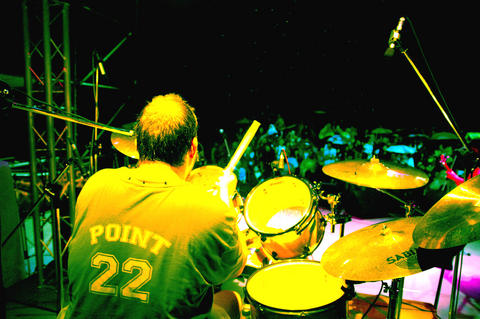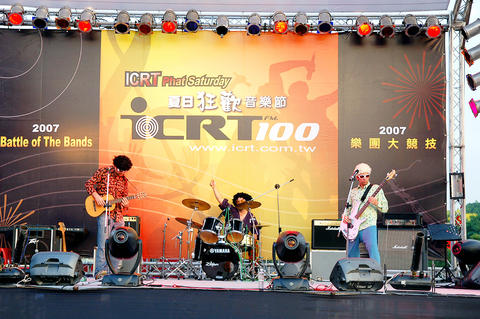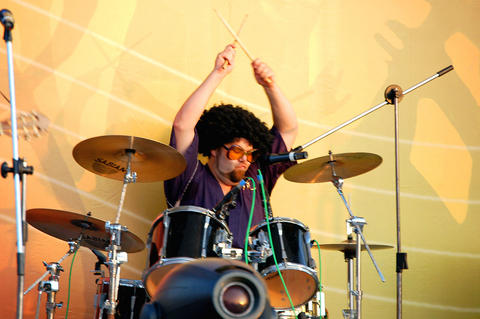As is the case with many bands, Point 22's first gig at Underworld was an electrifying experience - literally.
"I touched the microphone and my body filled with electricity," says guitarist Wade Davis. "Then during the second set I switched positions with the bass player and it happened again when I put my lips to the microphone."
It wasn't the first time an unsuspecting musician has been shocked by the Taipei basement bar/music club's faulty wiring; bassist Steve Taylor got zapped the same night. And it won't be the last. But the band is returning to play there anyway, tonight at 8pm, before heading to Bliss for another show at 10pm.

PHOTO: COURTESY OF POINT 22
Point 22 (.22) is a three-piece group from Taichung that won last year's ICRT Battle of the Bands, though they have no idea why since the English-language radio station doesn't normally play their kind of music. (Except "a week prior to our winning," Davis notes). They recently toured China, where they played 10 shows in 11 days and, so they heard, helped cancel a music festival in Shanghai because they were identified as a Taiwanese band.
Their influences are "Ween, the B-52's and Led Zeppelin," according to Davis. Or "anywhere from, let's say, Led Zeppelin, Johnny Cash, Jane's Addiction, Ben Harper, Prince, a lot of weird bands," if you ask Taylor. Sometimes they sound a little like a mellowed out Alice in Chains circa Jar of Flies. Americans Taylor and Davis, who's better known as the cofounder of Spring Scream, were in Dribdas. Drummer Pete Holmes, an Australian, used to play in Milk. All three musicians sing, sometimes in multi-part harmonies.
"We're not a serious band," Holmes says by telephone from Davis' house, where he and his bandmates could be heard popping open beer bottles during a rehearsal on Tuesday night. "We are serious about our music but we're not a serious band. We don't take ourselves seriously. It's all about good times and parties - and the ladies of course."

PHOTO: COURTESY OF ICRT
"We like to drink when we play," says Davis. "We like the audience to do the same."
When asked to describe Point 22's style, Davis responds that "it falls under rock 'n' roll, lots of harmonies, all three of us sing." It's "light, not too serious." Holmes believes it's "trash can funk, with some humorous punk" - or "you can make up anything you want." Taylor calls his group "the hardest-rocking band in Taichung."
According to Holmes: "We play love songs with nice harmonies and then the next song will be punk and in-your-face and screaming at you. We always try to catch the audience with their pants down."

PHOTO: COURTESY OF ICRT
The band is named after a small-caliber gun because, Davis says, "it was a combination of a word and numbers. And even though we're not really part of the NRA [the US' National Rifle Association] we are a .22-caliber band, meaning that we pack a punch but it's not gonna kill ya."
In October, Point 22 beat out young Taiwanese indie-rock acts Σ (summation), Staycool, Jacuzzi and Your Low End (憂樂園) in the finals of ICRT's 2007 Battle of the Bands, where the judging panel included an ICRT DJ and a producer for popular indie-rockers Tizzy Bac.
The next month they played multiple shows in the Chinese cities of Shenzhen, Guanzhou, Shanghai and Zhongshan. They were also scheduled to play the Shanghai 1234 Beach Rock Festival, but it was canceled.
According to Davis and Taylor, rumor had it this happened because the Chinese Communist Party was holding its 17th party congress at the same time - not a good time for a band to be billed as "Taiwanese." At another Chinese venue the owner was told not to pass out promotional fliers. "We kind of stopped saying we were from Taiwan," Davis says. "We said we were an international band."
Now they're back in familiar territory and are preparing to cut a third album. The first two - neither of which has a name - will be on sale for NT$100 each at both Bliss and Underworld.
Davis admits it's likely he'll be electrocuted again at Underworld, especially if it continues to rain. But he likes playing there anyway.
"It's a fun place to play, good energy," he says. However, "I'm definitely not wearing my flip flops."
For more information on Point 22 and to listen to their music, go to www.point22.com or www.myspace.com/point22.

One of the biggest sore spots in Taiwan’s historical friendship with the US came in 1979 when US president Jimmy Carter broke off formal diplomatic relations with Taiwan’s Republic of China (ROC) government so that the US could establish relations with the People’s Republic of China (PRC). Taiwan’s derecognition came purely at China’s insistence, and the US took the deal. Retired American diplomat John Tkacik, who for almost decade surrounding that schism, from 1974 to 1982, worked in embassies in Taipei and Beijing and at the Taiwan Desk in Washington DC, recently argued in the Taipei Times that “President Carter’s derecognition

This year will go down in the history books. Taiwan faces enormous turmoil and uncertainty in the coming months. Which political parties are in a good position to handle big changes? All of the main parties are beset with challenges. Taking stock, this column examined the Taiwan People’s Party (TPP) (“Huang Kuo-chang’s choking the life out of the TPP,” May 28, page 12), the Democratic Progressive Party (DPP) (“Challenges amid choppy waters for the DPP,” June 14, page 12) and the Chinese Nationalist Party (KMT) (“KMT struggles to seize opportunities as ‘interesting times’ loom,” June 20, page 11). Times like these can

Dr. Y. Tony Yang, Associate Dean of Health Policy and Population Science at George Washington University, argued last week in a piece for the Taipei Times about former president Ma Ying-jeou (馬英九) leading a student delegation to the People’s Republic of China (PRC) that, “The real question is not whether Ma’s visit helps or hurts Taiwan — it is why Taiwan lacks a sophisticated, multi-track approach to one of the most complex geopolitical relationships in the world” (“Ma’s Visit, DPP’s Blind Spot,” June 18, page 8). Yang contends that the Democratic Progressive Party (DPP) has a blind spot: “By treating any

You can tell a lot about a generation from the contents of their cool box: nowadays the barbecue ice bucket is likely to be filled with hard seltzers, non-alcoholic beers and fluorescent BuzzBallz — a particular favorite among Gen Z. Two decades ago, it was WKD, Bacardi Breezers and the odd Smirnoff Ice bobbing in a puddle of melted ice. And while nostalgia may have brought back some alcopops, the new wave of ready-to-drink (RTD) options look and taste noticeably different. It is not just the drinks that have changed, but drinking habits too, driven in part by more health-conscious consumers and